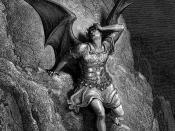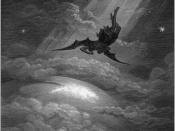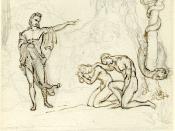Milton defines heroism in Paradise Lost as Biblical heroism, where the hero is not defined by physical strength but rather moral strength; this moral strength permits obedience to God. The Christian form of heroism obtains glory through submission rather then the heroes of past epics which obtain glory through defiance. In Paradise Lost, Milton asserts his intention to show that the fall of humankind is more heroic than the past epics of Homer and Virgil. Milton explains throughout his epic that Adam and Eve's fall is the major climactic event that occurs. He describes this fall as tragic and by doing so, Milton shows the vast seriousness of Adam and Eve's disobedience to God because their actions directly affect the rest of all humankind. As a result of their disobedience, they choose to repent for their sins and seek forgiveness from God because they learn from Raphael that individuals (such as Abdiel) can redeem themselves through continued devotion to God.
Simultaneously, Milton situates both Adam and Eve within the literary conventions of a tragedy, in which a great man falls because of a flaw within his otherwise, embellished character. The fall of Adam and Eve from God's grace makes way for mankind's ultimate redemption and salvation. Thus, Milton asserts that his epic surpasses the epics of Homer and Virgil since his pertains to the entire human race, instead of just one hero. I will show how Milton's definition of heroism is prevalent throughout Paradise Lost, which ultimately will help Milton "justify the ways of God to men" (26), by comparing two types of heroism, that I will call Hellenic and Biblical as defined by William R. Herman; by contrasting the heroes found throughout Paradise Lost; and by engaging three criticisms on Milton's definition of heroism by C.S. Lewis and William...


